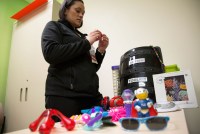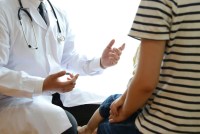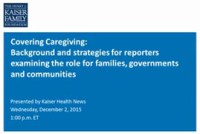It’s Not Just Doctors And Nurses, Patients Need To Wash Their Hands, Too
New research indicates that patients who leave the hospital for post-acute care facilities carry superbugs with them.
Managing Depression A Challenge In Primary Care Settings, Study Finds
Primary care physicians see many patients with depression. New research finds they continue to struggle to apply the treatment strategies used for other chronic illnesses.
Slowing Down The ER To Improve Care For Patients With Autism
A small but growing number of hospital emergency rooms are taking steps to improve quality of care for patients with autism while also adding efficiency and cost effectiveness.
Medicine’s Power Couples: A Challenge In Recruiting Physicians To Rural Areas
A research letter published in JAMA suggests that physicians increasingly marry people who match them in terms of educational levels and career pursuits, making it more difficult to attract them to small-town practices.
EHRs In The ER: As Doctors Adapt, Concerns Emerge About Medical Errors
As hospitals adopt electronic health record systems, some emergency rooms are experiencing new patterns of medical errors.
Military Health System’s Care For PTSD, Depression Falls Short, Report Finds
Experts cited stigma and a lack of doctors as potential obstacles for soldiers needing treatment.
Some health professionals worry that the task force’s findings could result in missed opportunities for early intervention.
Study: Doctors’ Texts Can Prod Patients To Take Drugs, But Questions Linger
In an analysis published Monday in JAMA Internal Medicine, researchers found that text message reminders help patients do better when it comes to taking their medicines. But questions about the specific ways to make the most of this strategy remain.
Combined Effects Of Maternal Obesity, Diabetes ‘Substantially’ Raise Autism Risks
A study published in the February issue of Pediatrics examines both the independent and combined effects of these two maternal health factors on children’s likelihood of developing autism spectrum disorder.
For Hospitals, Treating Violence Beyond The ER Is Good Medicine And Good Business
Hospitals increasingly view violence as a health concern and are developing initiatives designed to improve long-term community health.
Even With ‘Skin In The Game,’ Health Care Shoppers Are Not More Savvy
High-deductible health plans don’t necessarily trigger comparison shopping or informed health care choices by consumers, according to a survey published in Tuesday’s JAMA Internal Medicine.
Fueled By Health Law, ‘Concierge Medicine’ Reaches New Markets
Doctors, insurers and others are kick-starting experiments to broaden access to direct primary care, a service long associated with only wealthy Americans.
Research Gives Context To Addressing Nation’s Drug Abuse Crisis, Review Finds
As presidential candidates, state officials and even President Barack Obama wrestle with how to handle drug addiction, scientists lay out some of the intersections between opioid prescriptions and heroin abuse in the New England Journal of Medicine, including findings that crackdowns on opioid prescriptions may not fuel increases in heroin use.
Gaps Remain Among States’ Medicaid Efforts To Help People Kick Smoking Habit
Even though Medicaid enrollees are more likely to be smokers than the general public, a study published Tuesday in Health Affairs examined state data from 2010 to 2013 and found wide differences in funding of cessation efforts.
Broader Strategies Necessary To Counter Painkiller Over Prescribing, Researchers Say
A research letter published Monday in JAMA Internal Medicine says opioid-prescribing practices are consistent with that of other medications.
Who Are America’s Caregivers? Nearly A Quarter Are Millennials
About 40 million Americans considered themselves caregivers in 2013, according to an AARP report.
Doctors, Lawyers And Even The Bank Can Help Identify Elder Abuse
According to a New England Journal of Medicine research review, about 10 percent of older Americans may face some form of abuse, and primary care physicians are often positioned as the first line of defense.
When Something Goes Wrong At The Hospital, Who Pays?
Hospital practices vary when it comes to paying care costs for patients with bad outcomes. Sometimes, patients foot the bill.
Poll: Majority Of Americans Agree That The FDA Should Review Drug Ads Before They Air
Nearly eight in 10 say they have seen or heard these ads, and more than a quarter have discussed one of the drugs with a physician as a result.
Study Finds Improvements In Pay, But Not Equity, For Women Anesthesiologists
RAND Corp. researchers find that more women are going into anesthesiology and getting paid better, but they still trail their male counterparts.


























